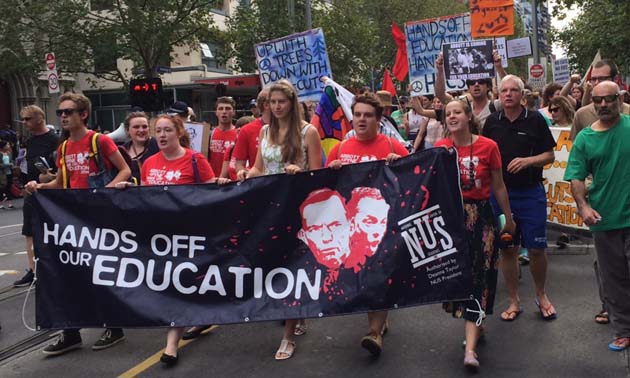Tony Abbott and Education Minister Christopher Pyne suffered another humiliation when their university deregulation plans were defeated in the Senate for a second time in March. Abbott’s budget agenda is now in tatters. The government has declared that its Medicare GP co-payment was “dead, buried and cremated”. The Coalition has been forced to drop its two most high profile budget attacks—for now.
But the government is in disarray. Abbott and Hockey have backflipped—going from demanding savage cuts to saying the budget is manageable. The backflip has dismayed senior public servants and big business.
And Abbott remains deeply unpopular. He seems incapable of taking his foot out of his mouth. Opinion polls show that the Liberals would lose any federal election, and Liberal MPs are still plotting to remove him.
After Abbott’s absurd comment that living in a remote Aboriginal community was a “lifestyle choice”, even Liberal-supporting conservative Aboriginal leaders like Warren Mundine and Noel Pearson rounded on him. This came after a self-destructive rampage against the Human Rights Commission’s Gillian Triggs over children in detention.
Abbott’s comments about an Aboriginal “lifestyle choice” came as open support of a vicious new wave of Aboriginal dispossession, with WA Premier Colin Barnett deciding to close down remote communities after Commonwealth funding cuts last year (see page 10).
The Liberals’ push for cuts and their obsession with the budget deficit are not going away. Treasurer Joe Hockey was keen to use the Intergenerational Report to press the case for spending cuts. Yet Abbott knows he can’t get away with further savage cuts, so he’s now telling us this year’s budget will be “dull and routine”.
But some of the cuts the Liberals did push through are starting to bite. Abbott’s cuts to remote Aboriginal communities may force them to shut down. The $600 million budget cuts to Aboriginal services is now forcing legal services, family support programs, youth and other vital services to close their doors. Hundreds of Aboriginal workers are being forced onto the dole.
Education Minister Pyne was willing to threaten 1700 research jobs by saying he would cut research funding unless the Senate supported university fee deregulation.
He backed down but has still only promised to maintain the funding for one more year. And Pyne says he is will bring back fee deregulation legislation after the budget.
Abbott is desperate to find scapegoats and distractions to try and save his own skin. He is hyping up the terrorism scare, becoming even more vicious in his racist allegations that the Muslim community are somehow responsible for terrorism (see page 13). He has also suggested refugees pose a terror threat, linking his “stop the boats” agenda to national security, although no terrorism suspect ever arrived by boat. The rallies for refugees on Palm Sunday and in April in Sydney can help combat this scaremongering.
Stronger fightback
The defeat of Abbott’s big ticket budget “reforms” is only a result of enormous public opposition. The protests against Abbott’s budget have indicated the extent of the opposition and put pressure on the Senate.
But the fightback needs to intensify. The March Australia rallies tapped the mood of anger against Abbott, drawing large crowds through social media. If the unions had backed them and waged a serious fight the Liberals could be dead and buried by now.
The ACTU’s national day of action on 4 March showed the possibility of a more serious fightback. Even without a call for a national strike, 20,000 unionists joined the largest protest in Melbourne. In NSW, a number of unions, including construction and the nursing unions did take strike action, and were by far the largest contingents on the protests. If the rest of the union movement had followed suit we could have seen protests on a scale that would really shake the Liberals.
Tragically, union leaders remain focused on an electoral campaign against the Liberals in marginal seats in 18 months’ time. This simply means putting our faith in Labor to deliver something different—and they are constantly disappointing. It does nothing to build workers’ confidence about their capacity to fight the Liberals or strengthen our ability to organise.
The next major focus for action against the Liberals will be the budget in May. Abbott may have shelved his initial plans to attack Medicare and universities, but it’s clear they are coming back for more. Thousands have rallied to stop the closure of Aboriginal communities. Thousands will March in March in Sydney.
Every union member needs to push for union action before the budget, demanding not just the end of the Liberals attacks but raising the need to tax the rich to fund services. This is the kind of action that can win real change.
Abbott may be on the ropes, but we need more strikes, protests and grassroots resistance to fight the Liberals’ agenda and finish him off.




